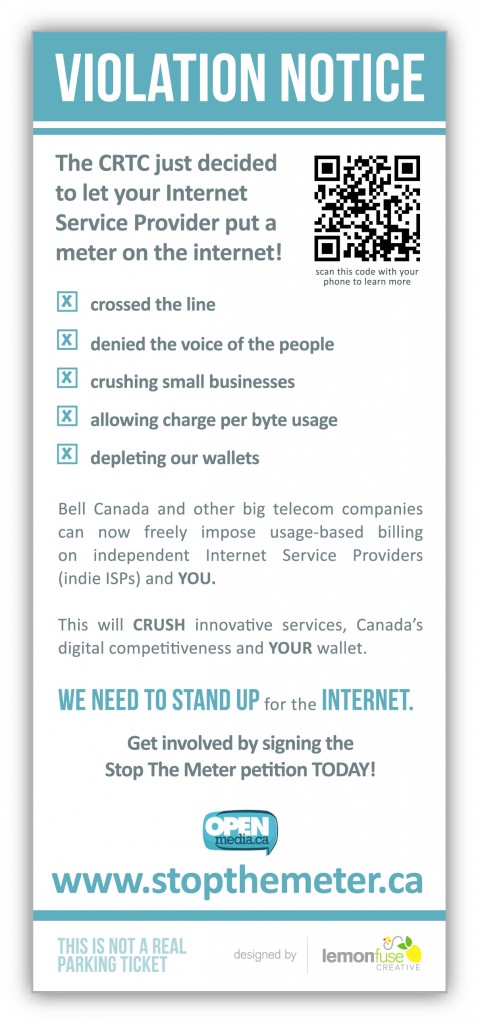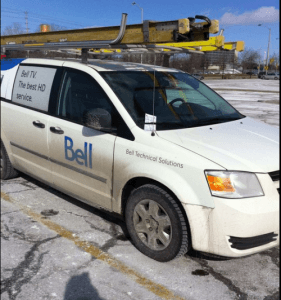
Although the English needs a little work, Korean broadband delivers a reality most Americans can only imagine.
South Korea has launched a nationwide broadband upgrade to rid themselves of 100Mbps service for $38 a month, claiming those speeds and prices are no longer sufficient for Korea’s new digital economy.
By the end of 2012, South Korea intends to connect every home in the country to the Internet at one gigabit per second and slash the monthly price to just $27 a month.
That’s more than 200 times faster than speeds enjoyed by most Americans, who pay an average of $46 a month — nearly double Korea’s planned price. Even more galling for Canadians — those speeds and prices are for completely unlimited access.
Stop the Cap! reader John in Victoria, B.C., thinks South Korea’s broadband improvements call out just how ludicrous Canada’s Internet Overcharging schemes really are.
“If the Canadian Radio-TV and Telecommunications Commission ultimately allows $2 per gigabyte in overlimit fees, we would have to pay $5,184,000 per month for the same thing,” John says. “If this comparison doesn’t make people want to chuck the CRTC, what will?”
For the government of South Korea, which is spearheading the Internet expansion effort, broadband has become a national priority for the fast-growing Korean economy.
[flv width=”640″ height=”447″]http://www.phillipdampier.com/video/Hello CJ TV.flv[/flv]
Korea’s CJ HelloVision cable system delivers TV programming, broadband, and phone service at speeds and prices that make North American providers look ridiculous. Bonus: That sure looks like Sarah Palin making a cameo appearance in this animated video. (1 minute)
South Korea historically trailed Japan’s economic post-World War II revival for decades, but no more. The country, which used to be poorer than the Communist People’s Republic of Korea to the north, has grown to the world’s 13th largest economic power, and has designs on being a world leader in the transition to the digital/information economy. They are already ahead of North America, with an advanced broadband platform that can sustain concepts like cloud computing that are just getting off the ground in Canada and the USA.

The KCC is spearheading Korea's broadband advancements
Only the most rural parts of Korea still rely on copper phone wires delivering DSL service, now considered archaic. Most of the country is now wired for fiber optics, making a transition from 100Mbps-1Gbps relatively simple. With new laser technology, existing fiber cables can transmit faster speeds, and when fiber is laid in the country, extra strands are buried for future use. The costs of burying 10 or 100 or 1,000 strands come mostly from labor, not the wiring.
Private electronics companies are strong proponents of the infrastructure upgrades, and service providers are on board to deliver the service. That is in marked contrast with providers in the United States and Canada who consider expensive upgrades an unnecessary proposition.
“Providers in the USA and Canada defend their existing networks as ‘good enough for average residential use,’ something that would be laughed away here in Korea or in Japan,” Dr. Park Sung-Jin, a Korean broadband researcher who travels between Seoul and Los Angeles tells Stop the Cap! “Large providers like AT&T cannot afford to lose their propaganda arguments of broadband sufficiency because if they did, they would lose face and be forced to transform broadband in the USA at the expense of their enormous profits.”
“In Asia, we would never allow our providers to dictate the national broadband policies of the country, and our discussions are long past arguing over what speeds are correct,” Park says. “Now we’re arguing about how to bring the cost down.”
Japan delivers 1Gbps broadband service for $70 a month, a price scoffed at by Choi Gwang-gi, the 28-year old Korean now in charge of the Korea’s expansive broadband plans.
“I can’t imagine anyone in Korea paying that much,” Choi told the New York Times. “No, no, that’s unthinkable.”
A pilot gigabit project initiated by the government is underway with 5,000 households in five South Korean cities. Each customer pays about 30,000 won a month, or less than $27.
“A lot of Koreans are early adopters,” Mr. Choi said, “and we thought we needed to be prepared for things like 3-D TV, Internet protocol TV, high-definition multimedia, gaming and videoconferencing, ultra-high-definition TV, cloud computing.”
[flv]http://www.phillipdampier.com/video/200Mbps Broadband.flv[/flv]
Hello Broadband delivers a silly advertisement for its soon to be obsolete 200Mbps broadband service. (1 minute)
Meanwhile, according to Dr. Park, North American providers like Bell, Rogers, and Comcast are spending millions trying to convince lawmakers in both countries that such speeds are wholly unnecessary.
“The United States and Canada are the worst, with providers spending countless millions themselves and through their lackey trade associations and illicit ‘consumer groups’ working for them trying to convince lawmakers American broadband isn’t so bad after all, but it is,” Park says. “They routinely claim any country that is ahead of the U.S. or Canada is a ‘special case’ because of urban density or government subsidies, but that can’t explain away all of the disparity in speeds and accessibility, only money and monopoly profits can.”
Both Romania and Latvia now beat Canada and the USA in broadband speeds and pricing, and North America’s dominance in a digital economy could be at risk.
Closer to home Don Norman, co-founder of the Nielsen Norman Group in Fremont, Calif., told the Times Korea is on the right track.
“The gigabit Internet is essential for the future, absolutely essential, and all the technologists will tell you this,” said Norman. “We’re all going to be doing cloud computing, for example, and that won’t work if you’re not always connected. Games. Videoconferencing. Video on demand. All this will require huge bandwidth, huge speed.”
In Canada, such predictions have given companies like Bell an excuse to engage in a national Internet Overcharging scheme they claim will help pay for building these kinds of future networks. But other countries around the world now deliver speeds Canada only promises their citizens, without overcharging them to pay for it.
“Charging for broadband traffic would be like you or I charging for the wind — it has no real value except in the eyes of the people who stand to profit from it,” Park said.
Will people notice a difference between 100Mbps and 1Gbps? Koreans say they will, according to the New York Times.
One of the customers already connected to Mr. Choi’s pilot program is Moon Ki-soo, 42, an Internet consultant. He got a gigabit hookup about a year ago through CJ Hellovision, although because of the internal wiring of his apartment building his actual connection speed clocks in at 278 megabits a second.
But even that speed — about a quarter-gigabit — has him dazzled.
“It is so much more convenient to watch movies and drama shows now,” he told the newspaper.
[flv width=”368″ height=”228″]http://www.phillipdampier.com/video/Giga Internet.flv[/flv]
This Korean language promotional video for Giga Internet, the marketing brand for 1Gbps broadband, still dazzles the imagination for those who lack the ability to follow the words. As you watch, consider how America’s typical DSL service provider leaves millions of Americans with a ‘covered wagon’ 3Mbps broadband solution. (6 minutes)
[flv width=”480″ height=”340″]http://www.phillipdampier.com/video/SK Broadband.mp4[/flv]
A stylish ad for SK Broadband, declaring new high speeds will let users “See the Unseen.” (1 minute)
 The Openmedia.ca folks have created several “parking tickets” designed to call attention to the issue of Internet Overcharging among ordinary Canadians.
The Openmedia.ca folks have created several “parking tickets” designed to call attention to the issue of Internet Overcharging among ordinary Canadians.

 Subscribe
Subscribe


 the
the 

